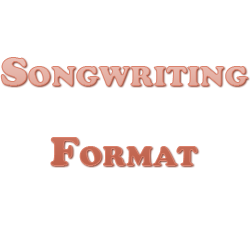Songwriting is easier if you have a natural talent for it, but make no mistake that there is no substitute for practice. Near any one of the greatest songwriters of all time all started out somewhere and their first ideas, most of which never get heard or released, are terrible. It takes time to develop as a songwriter and the more you write, the more ideas will come to you. But where do we begin when you’re not getting any ideas. How do you write a song without ANY previous experience?
There are a number of different ways on the topic of how do you write a song from scratch. The method I recommend particularly if you’re new to songwriting, because it leads to a lot of creativity and ideas with a very simple start is to begin by simply coming up with a song title for your future song.
The more unique and interesting the song title, the more you’ll get out of it in my experience. You can go a number of different ways with a title. For instance, you can go for a title which conveys a setting/emotion like having a season in the title. “Summer Song” as a title will make you think of something upbeat and positive as an example. Alternatively you can go with a title which lends itself to telling a story.
If you do the latter you’ll find an easier time coming up with the lyrics of a song whereas if you go with the emotion you’ll have a better time coming up with an initial hook. Just having that initial title will start us on our next step which incidentally enough is about coming up with a primary hook.
Once we have that initial hook everything becomes easier because we have a reference to work from. You can create melody for the adjoining sections of the song much more easily knowing the melody you’re going into or coming out of. So, knowing how useful that initial hook is at developing the rest of our song, how do we come up with that initial idea?
First pick a key, then take your title or more specifically each word in your title and even more specifically each syl lable of each word in your title and assign a different note to it within that key. Try moving directly up and down the notes in that key for each syllable or word, try jumping around to different notes, drag a note out for a number of syllables or words. The point is to keep experimenting with different combinations until you find something you like.
lable of each word in your title and assign a different note to it within that key. Try moving directly up and down the notes in that key for each syllable or word, try jumping around to different notes, drag a note out for a number of syllables or words. The point is to keep experimenting with different combinations until you find something you like.
The other half of a strong hook is not just the vocal melody itself but the surrounding parts around that hook. This includes in equal parts the instrumentation as well as the bass or chord progression which accompanies that melodic vocal hook. A vocal hook melody can be significantly amplified or diminished in terms of its effect depending on the support around that hook, so try working with different chord progressions within that key to decide what sounds best with that hook.


